The evolving “School for All” project: Expanding to 53,000 schools in eight African countries, promoting children’s learning, school lunches, and hand washing awareness
2021.06.01
The “School for All” project, which began in 2004 at 23 primary schools in Niger, has now expanded to approximately 53,000 primary and secondary schools in eight African countries and is improving the learning environment for children. In addition to an increase in the number of schools participating, the project has evolved significantly as voluntary activities by local residents emerged, based on the unique needs of each community. The project has expanded well beyond education to include areas such as improved nutrition and sanitation.
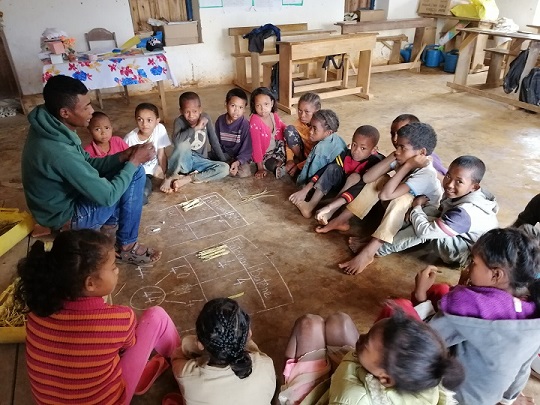
Children learning carry-over addition using sticks at a School for All remedial class (Madagascar)
“School for All” is a project in which parents, teachers, and local residents form a School Management Committee (SMC) and work together to create a school “for everyone.” It is a community-wide school management initiative operating in collaboration with the government. It supports the children’s learning not only by parents and teachers but also by the entire community sharing the importance of education.
With each partner country, JICA holds a series of discussions with each education ministry to formulate a project. It also provides advice and technical assistance on how to create the structure and mechanisms of the SMC and on ways to strengthen the capacity of the people involved in the SMC. JICA Senior Advisor KUNIEDA Nobuhiro, who has been engaged in the project for a long time, reflects on the importance of patiently coordinating awareness vectors with the people concerned.
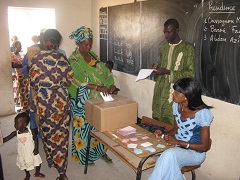
SMC representative elections by secret ballot (Senegal)
“Traditional practices are often obstacles to starting a School for All project. For example, it is an implicit rule that the representatives of organizations should be elders and/or men. However, motivated and capable representatives, regardless of gender, are needed for the SMC to improve the learning environment for children by implementing community-involved activities. School principals explained tenaciously to the local residents why voting for representatives was important and what could be accomplished through the implementation of the activities. The entire community was able to come to a common understanding through discussions. Of course, there were times when the discussions did not go well, but they were able to come to an agreement in the end because everyone had a sincere and passionate desire to ‘support the children’s growth’.”
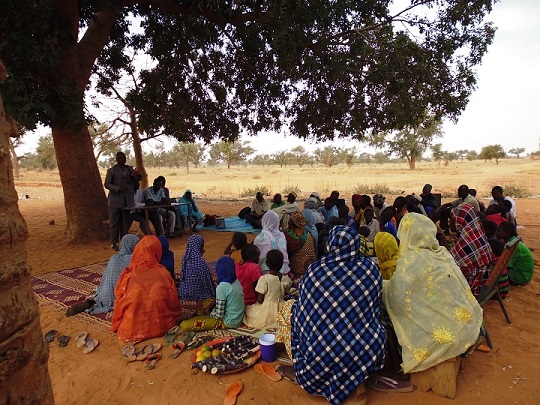
A community general assembly organized to discuss the school operation (Niger)
In this way, the School for All project has been inspiring the SMCs to take the leading role in implementing a variety of activities to improve the learning environment for children. This model, which originated in Niger, has now spread to about 53,000 primary and secondary schools in eight African countries, adapted to the educational circumstances of each community and country.
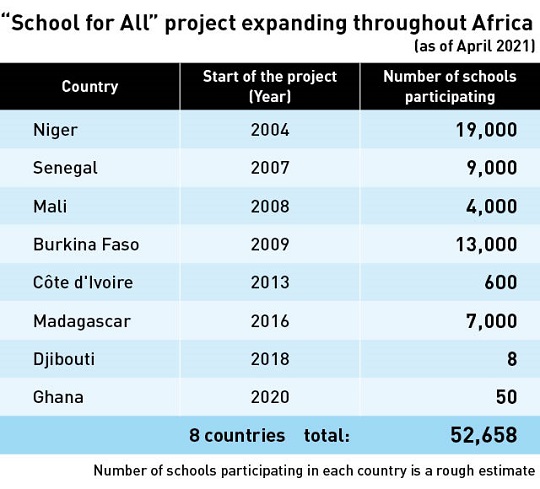
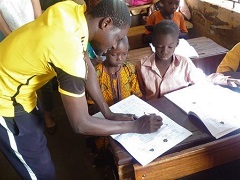
A remedial class using math drills (Mali)
When the project first began, the SMCs contributed to the improvement of the children’s learning environment by “everyone” working together on educational activities such as building straw-roofed classrooms and purchasing textbooks and stationery. Also, because the quality and quantity of learning in class were not sufficient, the SMCs in various communities began to implement remedial classes. In an effort to support children’s learning, adults in the community provided support by confirming the attendance of children and checking the answers to practice questions.
In order to increase the effectiveness of the remedial classes that began in various communities, JICA recommended the introduction of a proficiency-based teaching method that matches the level of understanding of each student. In Madagascar, a three-month remedial math class in 2019 resulted in an average improvement of 20 percentage points in test results for about 170,000 students.
This kind of idea and implementation of activities by the SMC is not limited to the field of education.
In Madagascar, a collaborative community school lunch program supported by “everyone” in the local area began in 2017. The supply of school lunches can sometimes be suspended during the agricultural off-season (around December to March every year) when the harvest of rice, Madagascar's staple food, is unstable. Therefore, everyone contributed the necessary items (rice, water, vegetables, labor for cooking, etc.) to provide the school lunches. Currently, the SMCs have also started to discuss what they can do to support infants, toddlers, and preschoolers, instead of limiting the focus to primary school students.
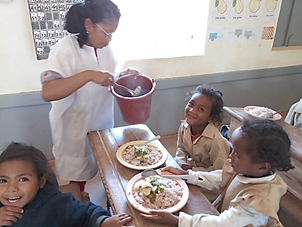
Children waiting for their school lunch. Serving the meals are local parents. (Madagascar)
In Senegal, vegetables harvested from SMC-supported school gardens improved school lunches and snacks. School lunch, incorporated with handwashing practices, is believed to have contributed to improved hygiene management through the prevention of infectious diseases.
Seeing the students enjoying their math remedial class and lunch with a smile, a government officer in charge of the project said, “I’m fully convinced that these community-supported activities will change education of our country.”
Having realized their potential through the implementation of education-related activities, SMCs began to tackle a broader range of issues beyond education.
During the Ebola epidemic in West Africa from 2014 to 2015, SMCs in Burkina Faso took initiative to hold community general assemblies for their respective communities in order to raise awareness among the local population on what Ebola is and how to prevent the infection.
Mr. Kunieda says that it is very encouraging to see how local community members search for better solutions and upgrade their activities as time goes by.
“In Mali, the School for All project started in 2008, but the 2012 coup d’état led to the unceremonious evacuation of the JICA expert team and the suspension of project activities for more than five years. I could not help but feel disappointed that the achievements of the project team would be lost in vain. However, when I visited the country in 2017, I saw the local people continuing to work for the children. I will never forget the surprise and excitement I felt,” says he.
At that time in 2012, Mr. Kunieda was the chief advisor of the School for All project in the neighboring country of Senegal, and he was actively exchanging information and sharing experiences with the members in Mali. He recalls that he was able to really feel the impact of the School for All project to establish foundations at the school level where “everyone” in the community can take the initiative and continue to engage in sustainable activities for the children. As for the future of the project, he states the following.
“In order to meet the educational goals of the SDGs, it is necessary to further scale up the community-based school management approach in which local people take the initiative in improving the learning environment for children. The scaling-up of this approach needs to be faster than ever before. To achieve this, it is essential that the partner governments in collaboration with development partners scale up this approach after the end of JICA-supported project or even in countries without such a project. I think it is imperative to refine and simplify further the School for All approaches so that more people can understand, utilize, and scale them up. We can promote this process through such actions as holding experience-sharing seminars and dispatching Japanese or third-country experts on a short-term basis.”
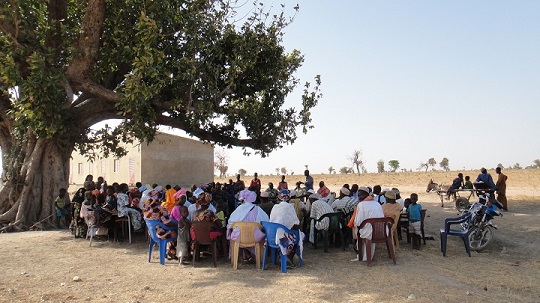
A community general assembly to plan school activities (Senegal). Local people are playing a leading role in efforts to improve the learning environment for children
scroll